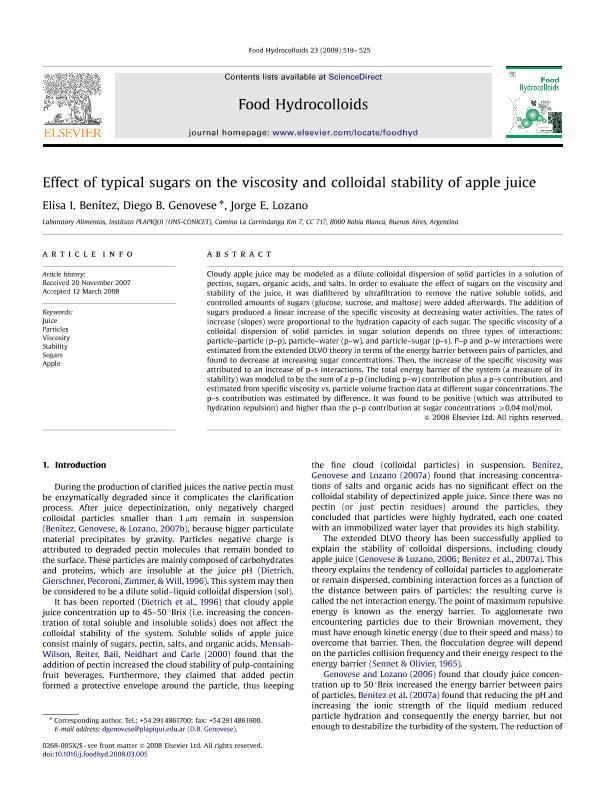Artículo
Effect of typical sugars on the viscosity and colloidal stability of apple juice
Fecha de publicación:
03/2009
Editorial:
Elsevier
Revista:
Food Hydrocolloids
ISSN:
0268-005X
Idioma:
Inglés
Tipo de recurso:
Artículo publicado
Clasificación temática:
Resumen
Cloudy apple juice may be modeled as a dilute colloidal dispersion of solid particles in a solution of pectins, sugars, organic acids, and salts. In order to evaluate the effect of sugars on the viscosity and stability of the juice, it was diafiltered by ultrafiltration to remove the native soluble solids, and controlled amounts of sugars (glucose, sucrose, and maltose) were added afterwards. The addition of sugars produced a linear increase of the specific viscosity at decreasing water activities. The rates of increase (slopes) were proportional to the hydration capacity of each sugar. The specific viscosity of a colloidal dispersion of solid particles in sugar solution depends on three types of interactions: particle–particle (p–p), particle–water (p–w), and particle–sugar (p–s). P–p and p–w interactions were estimated from the extended DLVO theory in terms of the energy barrier between pairs of particles, and found to decrease at increasing sugar concentrations. Then, the increase of the specific viscosity was attributed to an increase of p–s interactions. The total energy barrier of the system (a measure of its stability) was modeled to be the sum of a p–p (including p–w) contribution plus a p–s contribution, and estimated from specific viscosity vs. particle volume fraction data at different sugar concentrations. The p–s contribution was estimated by difference. It was found to be positive (which was attributed to hydration repulsion) and higher than the p–p contribution at sugar concentrations ⩾0.04 mol/mol.
Palabras clave:
Apple
,
Juice
,
Particles
,
Stability
,
Sugars
,
Viscosity
Archivos asociados
Licencia
Identificadores
Colecciones
Articulos(CCT - NORDESTE)
Articulos de CTRO.CIENTIFICO TECNOL.CONICET - NORDESTE
Articulos de CTRO.CIENTIFICO TECNOL.CONICET - NORDESTE
Articulos(PLAPIQUI)
Articulos de PLANTA PILOTO DE INGENIERIA QUIMICA (I)
Articulos de PLANTA PILOTO DE INGENIERIA QUIMICA (I)
Citación
Benitez, Elisa Ines; Genovese, Diego Bautista; Lozano, Jorge Enrique; Effect of typical sugars on the viscosity and colloidal stability of apple juice; Elsevier; Food Hydrocolloids; 23; 2; 3-2009; 519-525
Compartir
Altmétricas




